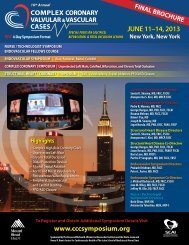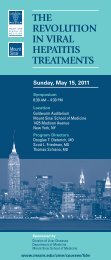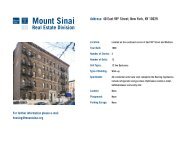Martha Stewart Center for Living Newsletter - Mount Sinai Hospital
Martha Stewart Center for Living Newsletter - Mount Sinai Hospital
Martha Stewart Center for Living Newsletter - Mount Sinai Hospital
Create successful ePaper yourself
Turn your PDF publications into a flip-book with our unique Google optimized e-Paper software.
Seniors as Mentors<br />
Seniors and students share<br />
dedication and wisdom<br />
On their first day of medical school, most students<br />
are enthusiastic, even exhilarated, full of energy<br />
and vision. By the time they graduate four years<br />
later, however, the same students are often frustrated,<br />
broke, and exhausted, and may have lost<br />
touch with the idealism that led them to medical<br />
school. <strong>Mount</strong> <strong>Sinai</strong>’s innovative Seniors as Mentors<br />
program is a model <strong>for</strong> how medical schools can<br />
renew the spirits of students while providing them<br />
with a unique educational experience.<br />
The premise is simple yet powerful: within weeks of starting<br />
at <strong>Mount</strong> <strong>Sinai</strong> School of Medicine, every incoming student is<br />
paired with one of the 3,000 patients in <strong>Mount</strong> <strong>Sinai</strong>’s outpatient<br />
geriatrics program. That relationship continues as the<br />
students move <strong>for</strong>ward all the way through their fourth year,<br />
constantly evolving to reflect the student’s newly acquired skills<br />
as well as the senior mentor’s health-care needs and strengths.<br />
While other medical schools offer such programs as electives,<br />
<strong>Mount</strong> <strong>Sinai</strong> is one of the very few that requires every student to<br />
participate.<br />
The program’s goal is not merely to assign physicians to<br />
geriatric patients, explains Rainier P. Soriano, MD, Director<br />
of Medical Student Education and Co-Director of Seniors as<br />
Mentors. In the first year, the seniors are not labeled as<br />
“patients” or the students as “doctors”. Instead, the students<br />
focus on developing an overview of their mentors’ history, their<br />
current interests and concerns, their hopes and fears <strong>for</strong> the<br />
future. “We want to give the students a snapshot of a person<br />
who ages well, to show them that there are older adults who<br />
lead very happy and healthy lives,” explains Dr. Soriano.The<br />
roles gradually shift as the students acquire skills and experience,<br />
per<strong>for</strong>ming physical examinations, checking blood<br />
pressure, assessing home safety and reviewing medication<br />
management. They also help their mentors set and achieve<br />
behavioral goals, such as increasing exercise. Third-year<br />
students share their mentors with incoming students, guiding<br />
and encouraging the new students – thereby becoming mentors<br />
themselves and sharpening their teamwork skills. “The assignments<br />
and activities change each year,” says Dr. Soriano, “sometimes<br />
related to their studies and other times to social factors.”<br />
Alexander Millman, a second-year student and president of the<br />
Geriatrics Student Interest Group, points out, “The program<br />
establishes a longitudinal experience <strong>for</strong> us. We learn how to<br />
build trust and <strong>for</strong>m positive relationships with our mentors –<br />
and thus our future patients - over time.”<br />
Bridging an unexpected gap<br />
Last year, the funding <strong>for</strong> this special program was not renewed.<br />
4<br />
Left to right Rev. Asha Ida Bell, Justin Lipper and<br />
Alexander Millman<br />
Rosanne M. Leipzig, MD, PhD, Vice Chair <strong>for</strong> Education of the<br />
Brookdale Department of Geriatrics and Adult Development,<br />
sought interim support from <strong>Mount</strong> <strong>Sinai</strong>’s Auxiliary Board.<br />
The Auxiliary Board has provided key support to <strong>Mount</strong> <strong>Sinai</strong> <strong>for</strong><br />
more than 90 years. Its 39 members immerse themselves in the<br />
life of the Medical <strong>Center</strong>, playing a vital role in maintaining<br />
excellence through their contributions of time, service and seed<br />
money <strong>for</strong> new projects. Sue Feld, Co-Chair of the Project<br />
Funding and Review Committee, explains: “At monthly meetings,<br />
our members are educated by invited speakers on a broad<br />
range of health and policy issues affecting the delivery of patient<br />
care and the evolving needs of <strong>Mount</strong> <strong>Sinai</strong> and the communities<br />
it serves.” The ground-breaking programs seeded by the<br />
Auxiliary Board include REAP (Resource Entitlement Advocacy<br />
Program), the Palliative Care Education <strong>Center</strong>, Pet-Assisted<br />
Therapy and many others.<br />
As a matter of policy, the Board seeds only new projects. An<br />
exception was made <strong>for</strong> Seniors as Mentors, and a bridge loan<br />
allowed the program to continue <strong>for</strong> this year. “When Dr.<br />
Leipzig brought this request to us, we were very happy to<br />
support it,” says Mrs. Feld. “It presents a perfect match <strong>for</strong> us,<br />
because it brings seniors from our community together with<br />
our medical students in mutually beneficial relationships.” The<br />
Board’s generosity has achieved its goal: the program is now a<br />
permanent element of the Medical School curriculum. Dr.<br />
Soriano points out, “This could change the culture of the entire<br />
medical school if it were done with every kind of patient, not just<br />
geriatric patients.”<br />
From the mentor’s perspective<br />
Last summer, the program convened a focus group of about 40<br />
senior mentors. “All the feedback was positive,” reports Dr.<br />
Soriano. “The patients are more aware of their medical<br />
problems, and more compliant with their care regimens. They<br />
also experienced their value as teachers <strong>for</strong> the next generation<br />
of doctors.”<br />
Continued on Page 5


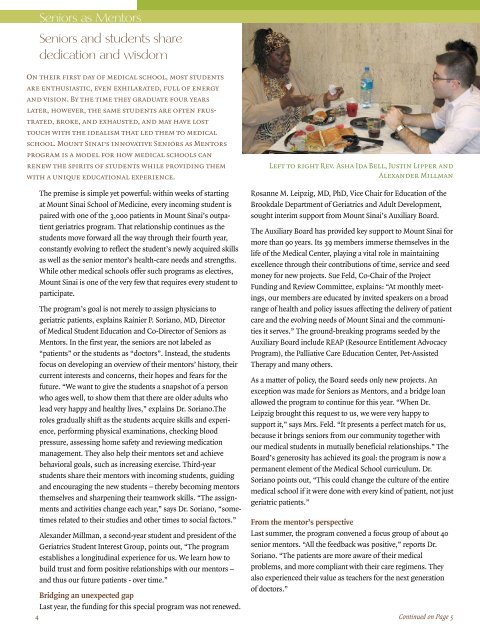
![December 2, 2012 [PDF] - Mount Sinai Hospital](https://img.yumpu.com/51092274/1/190x245/december-2-2012-pdf-mount-sinai-hospital.jpg?quality=85)
![January 21, 2013 [PDF] - Mount Sinai Hospital](https://img.yumpu.com/50916550/1/190x245/january-21-2013-pdf-mount-sinai-hospital.jpg?quality=85)
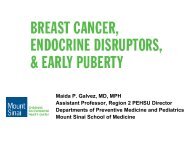
![February 3, 2013 [PDF] - Mount Sinai Hospital](https://img.yumpu.com/50584982/1/190x245/february-3-2013-pdf-mount-sinai-hospital.jpg?quality=85)
![March 18, 2012 [PDF] - Mount Sinai Hospital](https://img.yumpu.com/50462098/1/190x245/march-18-2012-pdf-mount-sinai-hospital.jpg?quality=85)
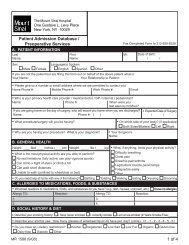
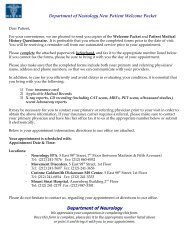
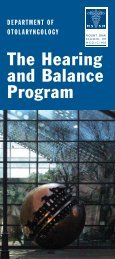
![Partners Program Guide [PDF] - Mount Sinai Hospital](https://img.yumpu.com/49411954/1/190x245/partners-program-guide-pdf-mount-sinai-hospital.jpg?quality=85)
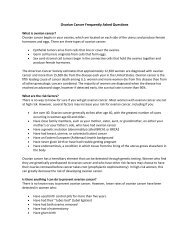
![March 19 - April 1, 2012 [PDF] - Mount Sinai Hospital](https://img.yumpu.com/48990923/1/190x245/march-19-april-1-2012-pdf-mount-sinai-hospital.jpg?quality=85)
![PGY-1 Residency Application [PDF] - Mount Sinai Hospital](https://img.yumpu.com/48577701/1/190x245/pgy-1-residency-application-pdf-mount-sinai-hospital.jpg?quality=85)
